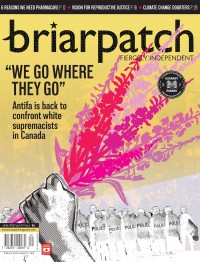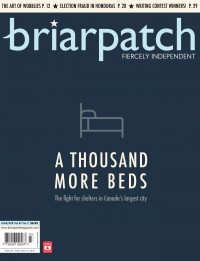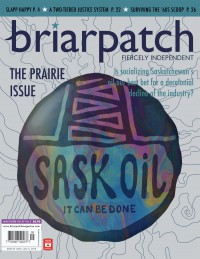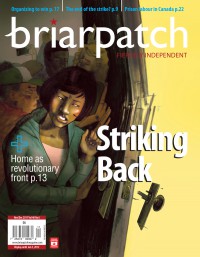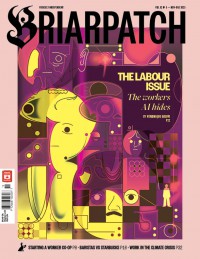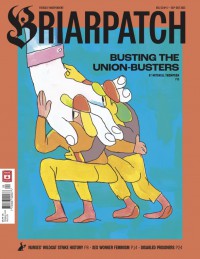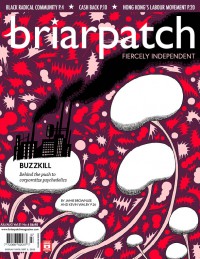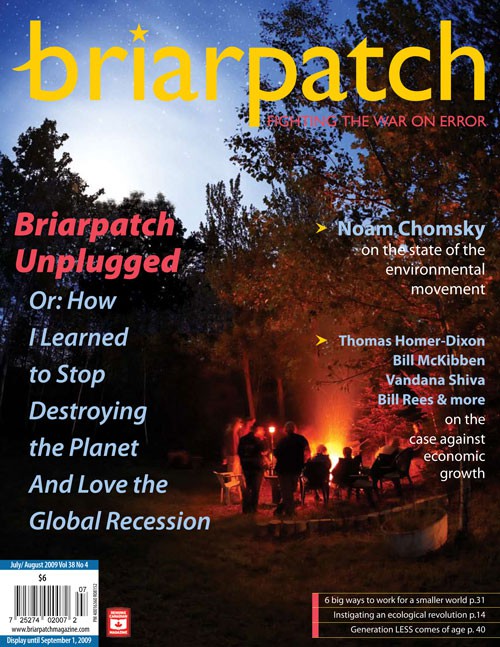
Unplugged
What if the ongoing economic recession is not just a regrettable temporary setback in the never-ending march of growth-fuelled prosperity, but the beginning of a painful but ecologically necessary process of scaling back our footprint to a more sustainable level? How would we go about reorganizing our society and economy around conservation and community well-being rather than economic growth and short-term profit?
-
 Magazine
MagazineLetter from the editor
This ship may not yet be going down, but it’s certainly heading straight for the rocks. How do we change course? Or failing that, where are the lifeboats that can preserve us and carry us back to shore? In less nautical terms, these are the sorts of questions with which this issue of Briarpatch is concerned.
-
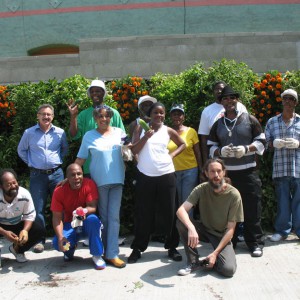 Magazine
MagazineSix big ways to work for a smaller world
Thank goodness for freegans, who have excelled at showing us how much food we waste every day. Freegans do for wasted food what the 100 Mile Diet has done for eating locally grown food. People who practice freeganism are also showing us how we can pinch pennies and save money in this recession.
-
 Magazine
MagazineWhy less is more
As humanity finds itself in the throes of twin crises – the worst economic crisis since the Great Depression and an ecological crisis that could threaten the very viability of our civilization – more and more people are grappling with the realization that the human project has somehow gone dreadfully awry. Many now recognize that endless economic growth on a finite planet is a recipe for disaster, yet until recently there has been very little exploration of the alternatives to this growth-at-all-costs system.
-
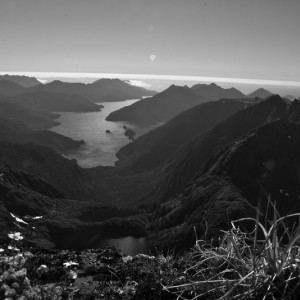 Magazine
MagazineOld growth, new approach
In December 2007, the Council of the Haida Nation and the Government of B.C. ratified a Strategic Land Use Agreement for Haida Gwaii, also known as the Queen Charlotte Islands, off the north coast of B.C., following four years of participatory planning in island communities. The agreement is a bold challenge to traditional economic policy, representing a major shift from an export-driven, resource-based economy to an ecologically grounded approach to a sustainable economy on Haida Gwaii.
-
 Magazine
MagazineSalt and earth
I first visited Whole Village in April 2007; over the course of the next 18 months, I lived on the farm in installations, working the land to earn my keep while photographing the community.
-
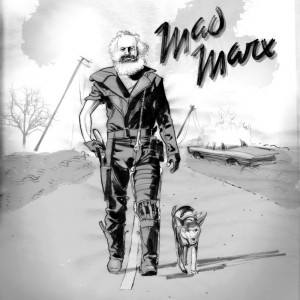 Magazine
MagazineEnvisioning ecological revolution
Underlying the goal of ecological revolution is the premise that we are in the midst of a global environmental crisis of such enormity that the planet’s entire web of life is threatened and with it the future of civilization. This is no longer a controversial proposition.
-
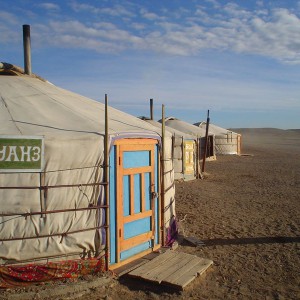 Magazine
MagazineThe myth of the wealthy environmentalist
Conventional wisdom tells us that because Finland is wealthy, its citizens have the necessary resources to take action on environmental issues – that prosperity and a healthier environment go hand in hand. Unfortunately, the world doesn’t work this way.
-
 Magazine
MagazineKick-starting the environmental movement
Some serious socio-economic changes have to be made. We’ve got this unsustainable way of life, particularly in the Western world, particularly in North America. The atomization of the population and the drive towards unwarranted consumerism and indebtedness have created very serious social, economic and cultural problems which have to be overcome.
-
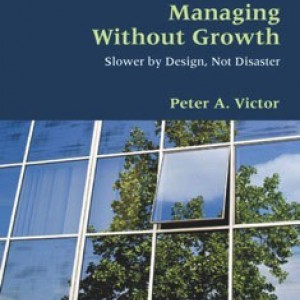 Magazine
MagazineSlower by design
The world economic crisis has nations around the globe in panic mode, working feverishly to get their economies growing again. But as Peter Victor suggests in his book Managing Without Growth: Slower by Design, Not Disaster, citizens of the richer nations may actually be better off if they stop trying to grow their economies.
-
 Magazine
MagazineShifting down
The current state of human affairs, characterized by rising levels of joblessness, depleted natural resources and deep-rooted attitudes of indifference and powerlessness to do anything about it, would prove little surprise to E.F. Schumacher, author of Small is Beautiful: Economics as if People Mattered, a seminal text of ecological environmentalism first published in 1973.
-
 Magazine
MagazineGeneration LESS
This recession has helped me redefine personal achievement – from the number of purchased goods I have to the intangible “goods” I have contributed to society. Those of us in our early to mid-20s have never experienced a recession as seemingly apocalyptic as the one we are in now.

